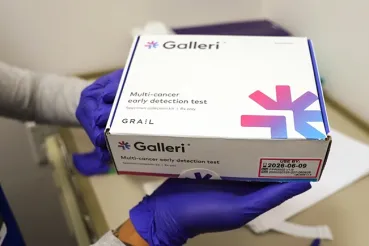Pancreatic cancer continues to be one of the most difficult cancers to diagnose and treat. Accounting for just 3% of all cancers, it has one of the lowest survival rates. But improvements in both surgical and medical treatments may be helping to improve outcomes, albeit slowly.
Here are four things you should know about pancreatic cancer.
1. There can be subtle signs and symptoms of pancreatic cancer.
Jaundice, or a yellowing of the skin, is one of the more common symptoms.
“Right-sided tumors often cut off the drainage system of the liver and cause jaundice,” says Sam Pappas, MD, a surgical oncologist at RUSH MD Anderson Cancer Center. “Painless jaundice is a classic symptom of concern for pancreatic cancer.”
Sometimes new onset diabetes combined with weight loss can be an early symptom of pancreatic cancer. Another sign of pancreatic cancer is abdominal pain that does not go away.
2. It’s important to know your risk factors.
You have a higher risk of developing pancreatic cancer if you have a strong family history of it. So, if you have two or more first-degree relatives, you may be a candidate for pancreatic cancer screening. And, like most cancers, early detection is key to improving survival.
There is no screening test for pancreatic cancers. Some early data suggests screening for pancreatic cancer may use MRI and/or an endoscopic ultrasound, which provide a high-resolution image of your pancreas. However, more research is needed to confirm routine use of MRI or endoscopy in clinical practice.
During the test, an interventional gastroenterologist can take samples of areas that may look abnormal. These tests can also identify precancerous lesions, which can be removed.
“Removing those lesions is one of the best ways to prevent pancreatic cancer,” Pappas says.
If you do have a family history, genetic counseling may be an option. Genetic counselors at RUSH MD Anderson can help you understand your family history and determine if testing would be beneficial for you. If you have a genetic syndrome, our team will monitor you to help catch anything early.
Other factors that may increase your risk for pancreatic cancer include the following:
- Alcohol
- Smoking
- Obesity
3. Surgery may be an option.
Surgery to remove and treat pancreatic cancer may be an option — specifically if the cancer is in its early stages. And surgery often offers the best chance for survival and managing the cancer.
In the past five to 10 years, there has been a complete shift in how to treat pancreatic cancer, particularly when it comes to the timing of surgery.
“In the past, there was a priority to figure out whether a patient was a candidate for surgery,” Pappas says. “Patients would often go straight into surgery without considering chemotherapy or radiation. But we looked at outcomes for these patients over the last several decades, and we weren’t moving the needle at all in terms of survival if people were getting surgery for pancreatic cancer first. So, now it is very standard for us to consider some patients for chemotherapy, radiation or a combination of the two before going into the operating room. And we have seen patients better overall with respect to survival with this approach.”
Nevertheless, about 85% of people who have pancreatic cancer are not candidates for surgery. People who are candidates for surgery must meet the following criteria:
- You must be in good enough health to tolerate major surgery.
- The cancer must be localized to the pancreas and lymph nodes — meaning it has not spread to other parts of the body.
4. Chemotherapy and other medications are improving.
Even if you are not a candidate for surgery, there are still options, like chemotherapy, that are helping people live longer.
While immunotherapy has been a game changer for certain cancers, like melanoma and lung cancer, it has not yet been as successful for pancreatic cancer. But RUSH MD Anderson is part of a clinical trial looking at the effectiveness of using a combination of chemotherapy and immunotherapy has shown promise for patients with pancreatic cancer.
At RUSH MD Anderson, most patients also get genomic sequencing. This helps identify the specific characteristics of the cancer and treatments that may be effective and help prolong and improve quality of life.




